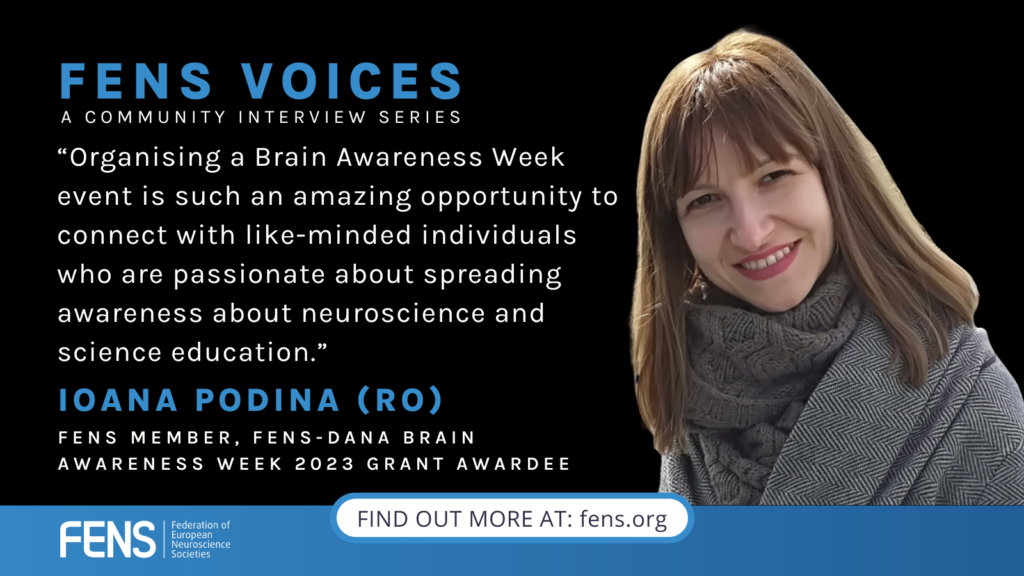
FENS Voices | Ioana R. Podina: The joy of sharing brain research
17 March 2023
FENS News, Neuroscience News
As Brain Awareness Week 2023 celebrates brain research this month, FENS invited Dr Ioana R. Podina to talk about the fifth edition of “My Curious Brain”, her FENS-Dana BAW project. Dr Podina is an Associate Professor at the University of Bucharest, at the Faculty of Psychology and Educational Sciences, within the Department of Applied Psychology and Psychotherapy. Currently, she is the Director of the Laboratory of Cognitive Clinical Sciences (LCCS), Chair of the SEPI research committee (Society for the Exploration of Psychotherapy Integration), and Country Coordinator for Romania in the Society for Psychotherapy Research (SPR). Her research interests are digital mental health, e-Health interventions, experimental psychopathology, and cognitive clinical sciences. Dr Podina is a clinical psychologist and psychotherapist with over ten years of experience in the field. Since 2015, she has been conducting UX research in collaboration with software companies. Read the full interview below.
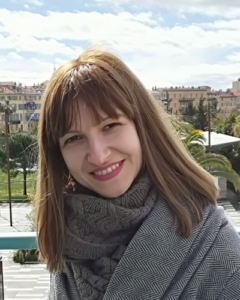
When and how did you become passionate about psychology? What interested you more: the complexity of the brain itself, the development of thought or human behaviour?
IP: My first psychology reads were in high school and sparked my interest in the field. I began with Carl Jung and gradually shifted to cognitive psychology, which better represented me. “What determines human behaviour? / What makes us act the way we act?” were the main questions that I wanted to answer by studying psychology. That obviously led me to the impact of thought and brain on this intertwined causal chain. However, it was a keen interest in behaviour that initially piqued my interest.
Who is your psychology/neuroscience role-model and what sets this person apart from peers?
IP: I was influenced by many, which all had a positive impact on my professional path. Starting with my PhD supervisor and moving on to some of my colleagues and peers. One of the people that I admire, but wouldn’t say is a role model as I don’t aspire to have the same trajectory, is Sergiu Pasca. Sergiu is a Romanian neuroscientist conducting groundbreaking research at Stanford University on cellular interactions in the human brain. He is an example of how hard work, brains, and determination can lead to success, regardless of nationality.
You studied Psychology for your bachelor’s degree, and then you obtained a Masters in Clinical Psychology, both at Babeş-Bolyai University. Why did you choose to pursue another Master’s degree in Genetic Counseling?
IP: Psychology is certainly fascinating, but the majority of the tools we used back in the days were mostly subjective. I felt compelled to complement my counseling skills and research with more objective assessments. This is why I dabbled in genetics and psychophysiology for a while. I fell in love with Genetic Counseling because it taught me how to talk to clients who had a traumatic cancerous history, and understanding hereditary transmission and recurrence probabilities helped me better understand their fears. To this day, when I work with cancer patients and survivors, I am grateful for my genetic counseling background, which complements psychotherapy so well.
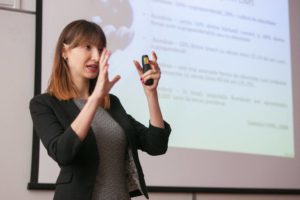 What were the highlights of your studying years? What was the most valuable lesson you learned?
What were the highlights of your studying years? What was the most valuable lesson you learned?
IP: Prof. Mircea Miclea’s cognitive psychology classes are still vivid in my mind. His poise and ease of communicating are characteristics of the type of teacher I aspire to be. However, the most valuable lesson I learned is philosophical in nature: you must divide your monsters, your stressors, into those that you can change and those that you cannot. Take on the first and accept the second. This Stoic philosophy greatly aided me in life.
What was the topic of your PhD thesis? When did you decide that you want to be a professor as well, aside from being a psychotherapist?
IP: My dissertation was about associative learning interventions. To understand the principles underlying our implicit learning, I delved into genetics, psychophysiology, cognitive and behavioral psychology. My way of returning to Jung. My methods were mostly experimental, and I was fascinated by the possibility of altering processes like distorted attention, memory, and implicit faulty interpretations of benign events. These are millisecond processes that are essentially automatisms of thinking and processing, and here I was attempting to alter them. I had some success stories and many experiments without significant results, which only made me respect the experimental method even more.
I knew I wanted to stay in academia to research and teach as soon as I was admitted to the PhD program. To me, this was a no-brainer. I also knew that I wanted to practice what I preached, so I continued with my clinical work. Teaching, psychotherapy, and research all bring me great pleasure and complement one another.
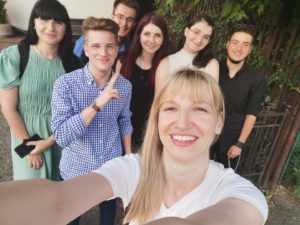
You are currently the head of the Cognitive Clinical Sciences Laboratory from the University of Bucharest (UB). Could you share with us the story of establishing your lab and your current research findings?
IP: I founded the Cognitive Clinical Sciences Laboratory back in 2017. It is the first research laboratory in psychology of the University of Bucharest and the first research entity of its kind in Romania. Our research focuses on digital mental health, e-Health interventions, psychopathology and experimental psychopathology, clinical cognitive sciences, meta-research, and cancer survivorship research.
One of our main goals is to promote scientifically validated outcomes and practices and combat pseudoscience in psychology. It’s so important to get the facts right in a time riddled by misinformation, and I’m thrilled that our laboratory has been able to generate research projects, internationally visible publications, and a series of dissemination events in just six years.
One of the most rewarding aspects of our work has been the opportunity to work with enthusiastic students who are passionate about research. Some of them became my colleagues, and others have gone on to study abroad.
Some exciting recent laboratory findings pertain to stress research in two different samples. A paper deals with exam stress in college students. It is a micro-longitudinal study in which students’ stress levels were monitored for six days prior to the exam and then assessed before, during, and after the exam. Not only were we fortunate enough to have such understanding students, but we were also able to investigate stress in an ecological setting, and it doesn’t get more ecological than a real exam. According to our findings, students with depressive traits (high scores on depression screening instruments) had a radically different exam experience. Their stress levels peaked a few days before the exam, and they remained elevated until the exam. Their less depressed peers’ stress levels gradually increased, peaking near the exam time, demonstrating their adaptability to the context. Students were unaware of the study’s purpose and were asked to self-report their stress levels. These findings are extremely intriguing, and serve to emphasise the importance of being more involved in our students’ mental health. The research can be found here.
A second study tackled cancer survivors and whether we can use Reddit posts to flag different stressful times in a cancer survivor’s life from diagnosis onward. We specifically looked for text markers of depression and anxiety, two symptomatologies triggered by stress, in the short-term (0 to 2 years since diagnosis), transition (2 years to 4 years since diagnosis) and long-term survivorship phases (5 years or more since diagnosis). The findings painted a picture of post-traumatic growth. Long-term survivors not only used less depression and anxiety cueing words in their posts, but they also had resources to share their experiences and support other cancer survivors. The preprint of the study is available here.
What are your plans for the future? What would your dream project look like in a parallel world, in which you would benefit from unlimited funding?
IP: I work a lot in digital mental health and currently this work is centered on cancer survivors. I would definitely like to develop digital tools that aid the mental health of survivors in the long-term. Same goes for any person in need of mental health support and especially youth. This is how I would use my unlimited funding to gather a large interdisciplinary team and be able to fund such clinically-relevant research in the long run.
Those interested in the event can follow us on Facebook and Instagram. Unfortunately, the content is available only in Romanian.
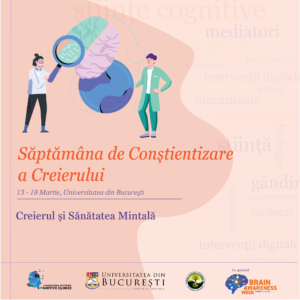
Brain Awareness Week 2023 will take place this week all over the world. Your initiative, “My Curious Brain”, will be celebrating its fifth edition with support from a FENS-Dana BAW grant and focus on “The Brain and Mental Health”. Why did you decide to host a BAW event in the first place and how is it to have done it for so long?
IP: I started organising my first Brain Awareness event during my first year at the University of Bucharest. The response was so positive amongst my students that it
got me hooked. In the following years I started seeing more and more people from the general community taking time to come to our events and that gave me the ultimate joy, as my purpose is to disseminate scientific knowledge. This is also one of our main goals at the Cognitive Clinical Sciences Laboratory, to promote evidence-based information and counteract pseudo-science, especially in psychology, which unfortunately is looming with pseudoscience.
What do you have in store for us? Can you tell us something about the event and about your team?
IP: This year’s edition of My Curious Brain, “The Brain and Mental Health”, will be an interdisciplinary event that will bring together experts from neuroscience, psychology, biology, and enzymology to discuss mental health from various perspectives. It will be a hybrid event, with some events taking place online and others in person. This is especially exciting because our audience will be able to interact with researchers from the country’s major university centers. We are going to discuss the shared phenotypes of autism and schizophrenia, brain boosting proteins and their role in Alzheimer’s prevention, reformed mental health diagnoses from the perspective of neuroscience, digital mental health interventions and assessment tools, and so on. We have a total of 17 lectures and workshops.
On this note, I’d like to mention how fortunate I am to be working with an active and highly energetic team of BA, MA, and PhD students who are assisting me greatly in the organisation process. They will also hold mental health workshops for students and community members who are interested. I would also like to mention that we had a volunteer who assisted with all of our promotional materials, that look fantastic. I am confident that we will do well at this international event.
Why should someone aspire to become a Brain Awareness Week organiser?
IP: Organising Brain Awareness Week is such an amazing opportunity to connect with like-minded individuals who are passionate about spreading awareness about neuroscience and science education. When we come together with other countries worldwide, we feel like we’re part of a bigger dissemination project that can make a real difference in the world. Plus, the event’s global reach allows us to share information and resources with people from all walks of life.
One of the best things about organising Brain Awareness Week is the chance to make a positive impact in our own communities. By hosting events and activities that promote science education, we can inspire others to grow an interest in these topics and learn more about the amazing world of neuroscience.
Finally, being a Brain Awareness Week organiser can be a truly rewarding experience both personally and professionally. It offers opportunities to develop leadership skills, collaborate with others, and engage with the public on important topics. So, if you’re passionate about science and want to make a difference in the world, consider joining Brain Awareness Week!
About Brain Awareness Week
Brain Awareness Week (BAW) is the global campaign to increase public awareness of the progress and benefits of brain research. Organised by the Dana Foundation, Brain Awareness Week (BAW) is an opportunity to let people know about the progress that is being done in brain research as well as progress in the diagnosis, treatment and prevention of disorders of the brain, such as Alzheimer’s, Parkinson’s, stroke, schizophrenia and depression. The 2023 edition of Brain Awareness Week takes place on 13-19 March. Every year, FENS, on behalf of the Dana Foundation, offers grants to Brain Awareness Week event organisers.
About the Federation of European Neuroscience Societies (FENS)
FENS is a governing partner of the International Brain Bee. Founded in 1998, the Federation of European Neuroscience Societies is the main organisation for neuroscience in Europe. It currently represents 44 national and single-discipline neuroscience societies across 33 European countries and more than 22,000 member scientists. Discover FENS and subscribe to our biweekly News Alert, with information on our latest calls and activities.